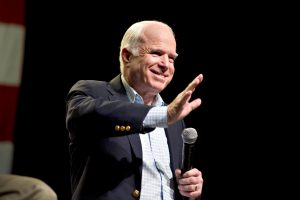On Thursday, China slammed U.S. Senator John McCain (R-AZ) over a statement he made in Tokyo on Wednesday, when the senior American lawmaker referred to the Diaoyu/Senkaku Islands as “Japanese territory.” The senator later walked back the claim slightly.
“The Diaoyu Islands are inherent territory of China and anyone’s attempt to deny the fact will end up in vain,” a spokesperson for China’s Foreign Ministry told China Daily in a written statement.
“We urge the relevant U.S. lawmaker to stop making irresponsible remarks and avoid further complicating relevant issues and regional situation,” the statement added.
The Foreign Ministry was referring to comments McCain had made the day before to reporters following a meeting with Japan’s foreign minister.
According to Kyodo News, McCain told reporters in Tokyo, “The Congress in the United States resolution last year said the Senkaku is a Japanese territory. That is our position as a congress and as a government. I will continue to repeat that when I go to China.”
This statement, his claims notwithstanding, put him at odds with U.S. policy, which maintains that Washington will not take sides on any sovereignty dispute so long as it’s resolved without the use of force or coercion.
McCain appeared to be referring to the Webb Amendment, which the Senate passed unanimously last year as an attachment to the National Defense Authorization Act. Although McCain was a co-sponsor on the amendment, he appears to have inaccurately conveyed its substance last week.
The relevant parts of the amendment were in line with U.S. policy on the issue, stating: “While the United States takes no position on the ultimate sovereignty of the Senkaku islands, the United States acknowledges the administration of Japan over the Senkaku Islands” and “the unilateral actions of a third party will not affect United States acknowledgement of the administration of Japan over the Senkaku Islands.”
The Senate also passed a much more extensive resolution on territorial disputes in Asia back in June of this year. This resolution went much farther in singling out China for criticism over some of its actions in the South and East China Seas, specifically its stepped up patrols and locking radar on Japanese vessels. Throughout the entire resolution, the Senate also referred to the islands only by their Japanese name, the Senkakus, except for in one instance in which it was directly quoting a Chinese official.
Still, the relevant part of the June resolution was consistent with U.S. policy of not taking sides on issues of sovereignty. “Whereas although the United States does not take a position on the ultimate sovereignty of the Senkaku Islands,” the resolution said, “the United States Government acknowledges that they are under the administration of Japan and opposes any unilateral actions that would seek to undermine such administration.”
In light of this, McCain stepped back from his earlier comments while in Beijing on Friday. “The U.S. has no position on the sovereignty issue of the Diaoyu Islands,” McCain said during a meeting with China’s State Councilor Yang Jiechi, Yonhap News Agency reported, citing Chinese transcripts of the press conference.
The State Department has refused to comment on the senator’s statement while in Tokyo.
Overall, McCain’s stop in Japan seemed to go very well from the standpoint of the U.S.-Japanese alliance. News reports suggested that, while stopping well short of endorsing a plan, McCain indicated to Prime Minister Shinzo Abe and Defense Minister Itsunori Onodera that he would give consideration to the issue of funding the transfer of U.S. military forces from Japan to Guam. The two countries have agreed on the force realignment but a lack of funding has delayed implementation.
McCain also spoke glowingly of Abe’s leadership, including his economic plan.
“We are counting on you to realize the full promise of what the [Japanese] Prime Minister calls the ‘three arrows’ of his economic agenda,” McCain said in a speech he gave to Japanese youth at Tokyo’s America Center on Wednesday, referring to Prime Minister Abe’s plan to reinvigorate Japan’s economy.
During the speech, McCain also told the audience that the U.S. has never doubted Japan’s economic recovery. “Let me speak directly to the Japanese people, especially the young Japanese here today: Your friends in America not only refuse to count you out. We are absolutely counting on you,” McCain said.
He also warned the audience against counting the U.S. out because of its recent economic troubles and dysfunctional politics. The speech focused heavily on Japan and America’s shared political values as a source of strength for each country, as well as for their bilateral alliance.
McCain calling the Diaoyu/Senkaku Islands “Japanese territory” was not the only comment he made that likely angered Beijing. During his stay in Tokyo McCain strongly endorsed Abe’s plan to revise Japan’s constitution to allow the Japanese Self Defense Forces to play a more active role in regional security.
Kyodo paraphrased the Arizona Senator as saying, “The current environment presents challenges not foreseen when the Constitution was introduced in 1947, including piracy and a need to aid allies such as the United States if they are attacked.”
In the speech at the American Center, McCain added, “We are counting on you to achieve your own goals of modernizing Japan’s Self-Defense Forces and national security institutions, to expand our defense cooperation, and to work with us to ensure a sustainable and effective U.S. force posture in Japan and the region.”
At one point in his trip, McCain also said that he continues to hear “rhetoric from certain authorities in China, which is not helpful,” without going into further detail.
McCain is now in South Korea where he is expected to make the human rights situation in North Korea a focus of his trip. It is McCain’s first trip to South Korea since 1991, according to Yonhap.

































